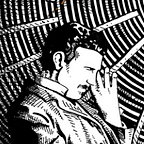Henry Alford follows the paths of wandering books and reflects on humor, fourth-grade read-alouds, and his new book.
Sometimes, on scoping out my bookshelves, people will exclaim with surprise, “You have a Humor section!” Which is always weird to me because, uh, I write humor.
What penetrating insights can we make from this literary assemblage? Primarily that this is an active and not a “dead” bookshelf: some of the books are no longer in their original placement or adjacent to other books by the same author, suggesting heavy or moderate traffic. The volume of S. J. Perelman’s correspondence has wandered off from the other four Perelman books, perhaps expressing non-binary tendencies by cuddling up next to the book and lyrics of Hairspray. One of the Ian Frazier books has forsaken the frilled and ornate charms of W. S. Gilbert for the fiery splendor of Sandra Tsing Loh, and the four Mark O’Donnell books are sprinkled about the shelf like cocoa powder on a latte. If distance from one’s siblings is a proportional measure of frequency, the placement of books by female authors is even more flattering: the single books here by Tsing Loh, Roz Chast, and Fran Lebowitz aren’t even on the same shelf as other books by the same authors.
What are we to make of the books that have been shelved horizontally rather than vertically? This, too, reflects either recent usage, or, sometimes, increased honor. Improv Nation is the last book I read; while reading it, I had reason to look at Me Talk Pretty One Day, to see if it was the Sedaris volume whose dust jacket displays reviews written by both my boyfriend and me. (It is not. That incestuously homosexual distinction falls to its paperback.)
Please Don’t Eat the Daisies, an essay collection by Jean Kerr, has the honor of being the first humor book I remember reading as a child. In the fourth-grade, in Worcester, Massachusetts, I brought Please Don’t Eat the Daisies into my homeroom and read parts of it aloud to two of my classmates because, outside of the Mary Tyler Moore Show and Carol Burnett’s variety show, it was the funniest thing that I had ever laid my eyes on. (I returned to it five years ago and had a less saliva-flecked reaction.)
Spy: The Funny Years, a history of the satirical magazine, holds a special place in my heart because Spy is the comedic womb from which I sprang: its editors gave me my first writing job.
A Confederacy of Dunces is on my short list of favorite comic novels. To meet Ignatius J. Reilly — a brilliant but fractious scholar of the Medieval period who is constantly at odds with the contemporary world’s allegiance to tawdry commerce — is to fall into a kind of love. A kind of appalled love.
Finally, And Then We Danced, which is, cough cough, my own just-published work. While other librarians are more likely to shelve it in Dance or Memoir, I’m going with Humor. I need all the boost I can get.
